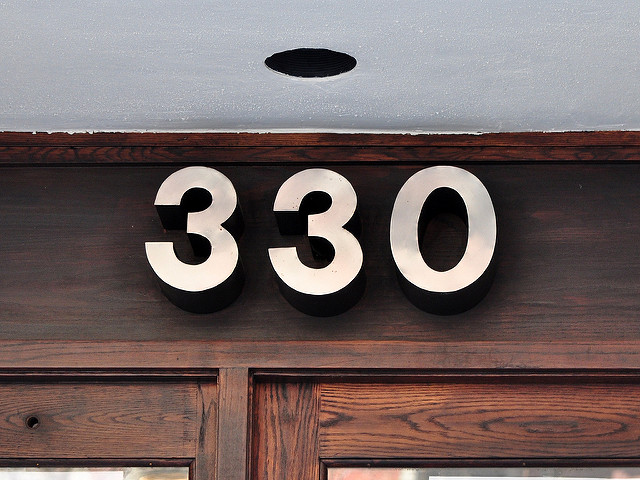
If you have taken or are planning to take the GRE, you’ll need to know what GRE score will give you your best chance of admission to grad school. Is a GRE 330 score good? Should you aim higher? Lower?
In this article, we discuss how good a 330 GRE score is by analyzing both percentiles and average GRE scores of popular programs. We also talk about how important it is to get a 330 GRE score and what you can do to reach (or even exceed!) this score level.
Feature image: Robert/Flickr
Is 330 a Good GRE Score?
The fact of the matter is, most grad programs don’t look at total GRE scores but rather your individual scores for Verbal and Quant. Therefore, how good a GRE 330 is depends on two key factors:
- What individual percentiles you scored in on Verbal and Quant
- What kinds of GRE scores your programs want
Let’s start with percentiles. Percentiles tell you what percentage of test takers scored lower than you on a particular section or the test as a whole. The higher your GRE percentile is, the more competitive your score is.
Each year, ETS calculates individual percentiles for Verbal and Quant (as well as for Analytical Writing, though this score is separate from your total score). As such, how your scores add up to 330 can vary: you could get 165 on Verbal and 165 on Quant, 170 on Verbal and 160 on Quant, etc.
Generally, you’ll want to get a higher score on the GRE section more closely related to your field. For example, if I were applying to math PhD programs, I’d benefit most by aiming for a higher Quant score. We’ll cover this idea in more detail later.
Quick side note: we've created the world's leading online GRE prep program that adapts to you and your strengths and weaknesses. Not sure what to study? Confused by how to improve your score? We give you minute by minute guide.
You don't NEED a prep program to get a great GRE score. But we believe PrepScholar is the best GRE prep program available right now, especially if you find it hard to organize your study schedule and don't know what to study.
Click here to learn how you can improve your GRE score by 7 points, guaranteed.
Now, what are the current GRE percentiles exactly? The following table offers a 10-point range of GRE scores (that are most likely to add up to 330) and their corresponding percentiles:
| Score | Verbal Percentile | Quant Percentile |
| 170 | 99 | 97 |
| 169 | 99 | 96 |
| 168 | 98 | 94 |
| 167 | 98 | 92 |
| 166 | 97 | 91 |
| 165 | 96 | 89 |
| 164 | 94 | 87 |
| 163 | 93 | 84 |
| 162 | 91 | 81 |
| 161 | 88 | 78 |
| 160 | 86 | 76 |
Source: ETS GRE Interpretive Data Table 1A
In this chart, Verbal percentiles range from the top 1 percent to the top 14 percent, while Quant percentiles range from the top 3 percent to the top 24 percent.
Interestingly, Verbal percentiles are consistently higher than Quant percentiles. This is because more test takers score highly on Quant than they do on Verbal, making Quant a more competitive section. Thus, to get the same percentile on both Verbal and Quant, you’d need to earn more points on Quant than you would on Verbal.
So what percentiles are considered “good”? Broadly, anything above the 50th percentile (median) can be considered a good score, and anything above the 75th percentile a great score. In addition, anything in the 90th percentile or higher can be considered an excellent score.
Using this definition, we can say that all scores in this chart are great GRE scores, with most qualifying as excellent. Specifically, 162-170 on Verbal and 166-170 on Quant can be considered excellent scores.
Ultimately, though, whether a GRE 330 is good isn’t determined solely by percentiles—you must also know what your specific programs are looking for in regard to GRE scores.

GRE Score 330: What Are Your Chances of Admission?
What’s more important than percentiles? Knowing what kinds of GRE scores your grad programs want. And the best way to figure this out is to see what the average GRE scores of your programs are.
Typically, you’ll want to aim for GRE scores at or above your program’s averages. If your programs’ averages are around 330, this will be a good score for you as it’s likely to make you a competitive applicant. But if your programs’ averages are more than 330, you’ll need to aim higher to give yourself a better chance of admission. (And if the averages are lower than 330, you can either aim lower or still go for 330 to give yourself a very high chance of acceptance.)
To learn how to find your programs’ average GRE scores, read our guide to setting a GRE goal score.
Below, we give you a list of schools and programs you’d be competitive for with a GRE 330 score. We also give you examples of harder “reach” programs that want scores higher than 330 as well as easier “safety” programs that want scores a little less than 330.
Target Schools
| School / Program | Average GRE Score |
| UCLA — Management PhD | 329 |
| MIT — Aeronautics and Astronautics | 329 |
| UT Austin — Economics | 328 |
| Harvard — Chemistry | 329 |
| Carnegie Mellon — Public Policy and Management PhD | 330 |
| Stanford — Sociology PhD | 329 |
Reach Schools
| School / Program | Average GRE Score |
| UT Austin — Finance | 332 |
| Stanford — Statistics MS | 331 |
| Harvard — Economics PhD | ~336 |
| UT Health San Antonio — Radiological Sciences | >330 |
Safety Schools
| School / Program | Average GRE Score |
| University of Michigan — Business PhD | 325 |
| Rice — Bioengineering PhD | 326 |
| UPenn — Political Science PhD | 326 |
| NYU — Physics | 325 |
| Duke — Public Policy Studies PhD | 320 |
| UC Berkeley — Clinical Science | 326 |

How Important Is Getting a 330 GRE Score?
Ultimately, how important getting a GRE 330 is depends on where you’re applying.
Some programs—usually competitive ones—will strongly consider GRE scores during the admission process. Why? Well, with a more selective admission process, these programs need more application components to use in order to evaluate potential students.
So if one of your programs is fairly competitive and has an average 330 GRE score, getting at least 330 will be critical. Not getting this score doesn’t mean you’ll be automatically rejected but does mean it’ll be harder for you to make a good impression on the admission committee (and thus get accepted).
In addition, master’s programs tend to place slightly more emphasis on GRE scores than doctoral programs do. This is most likely due to the fact that PhD programs typically focus more heavily on relevant work or research experience than standardized test scores. Because master’s students often have less experience in their fields than PhD students do, GRE scores tend to play a bigger role in admission.
For some programs, such as MFA programs, GRE scores might be required but aren’t that important. Some programs will even outright say that they don’t place a lot of emphasis on GRE scores. With these programs, getting below 330 won’t look that bad, as long as you have a strong portfolio, statement of purpose, etc.
Another factor to consider is which GRE section is more important to your field or program. Typically, grad programs look more closely at one score (either Verbal or Quant)—and some don’t even look at the less relevant score at all!
Verbal scores are more important to writing- and reading-heavy programs, such as those in the arts and humanities and social sciences. On the other hand, Quant scores are more important to math-related programs, such as those in the STEM fields.
For example, a highly ranked PhD program in physics will want to see a super high Quant score and (most likely) at least an average or above-average Verbal score. In this case, getting 330 overall isn’t as crucial as getting a high Quant score. Thus, you’d probably have a better shot at admission if you were to get 170 on Quant and 155 on Verbal (adding up to 325) instead of 168 on Verbal and 162 on Quant (adding up to 330).

How to Get a 330 GRE Score
To score 330 on the GRE, you must first make a GRE study plan. Since you already know your goal score (330), all you need to do is take an official GRE practice test to get your baseline score (i.e., the score you have before beginning any test prep).
Next, figure out how many hours you need to study in order to hit your goal score by test day. Use the table below to determine (roughly) how many total hours you’ll need to commit to in your GRE prep.
Note: The following GRE point improvements are overall and not per section. So if you wanted to make a 20-point improvement by studying 160 hours, you could end up gaining 15 points on Verbal and 5 on Quant, or 17 points on Verbal and 3 on Quant (and so on).
| Total Point Improvement | # of Study Hours |
| 5 pts | 40 hrs |
| 10 pts | 80 hrs |
| 20 pts | 160 hrs |
| 30 pts | 240 hrs |
Finally, divide up the number of hours you must study by the number of weeks you have before your test date to get an estimated weekly number of study hours. For instance, if I plan to study 160 hours over the course of five months, I’ll need to prep about eight hours per week.
Once you have your study plan, make sure you’re doing everything you can to hit your target score of 330. Here are some of our top GRE tips:
Want to improve your GRE score by 7 points? We have the industry's leading GRE prep program. Built by world-class instructors with 99th percentile GRE scores, the program learns your strengths and weaknesses through machine learning data science, then customizes your prep program to you so you get the most effective prep possible.
Try our 5-day full access trial for free:
- Understand the format of the test: Learn the overall GRE structure as well as its question types and content so that there are no surprises for you on test day.
- Use high-quality resources: You’ll get the best GRE practice by using official and highly rated unofficial materials, including PDFs, prep books, and practice tests. And the best part is, many of them are free!
- Know which section you need to target: When aiming for 330, you’ll likely need to score higher on Verbal or Quant (versus simply aiming for 165 on both). Figure out which of the two sections is more important to your field and then start dedicating a little more of your prep time to that section.
- Learn key strategies: Know how to attack different question types on test day as well as how to use your time wisely so that you can give yourself your best shot at hitting 330.
But what if you’d like to score higher than 330? In addition to using the tips above, do the following in your prep:
- Closely analyze your mistakes: You won’t make any improvement on the GRE unless you understand exactly what you’re doing wrong. Look for patterns in the mistakes you make on practice questions to figure out how you can avoid making these same errors in the future.
- Target your weaknesses: Basically, pay special attention to any areas you’re struggling with. For example, if you’re consistently getting Reading Comprehension questions wrong, drill this question type more often, test out new strategies, and re-solve any questions you get wrong.
What’s Next?
Aiming higher for a 330 (coming soon)? Or a little lower for 300 (coming soon)? Check out our guides to learn what kinds of programs you can get into with these GRE scores and more.
What’s a good GRE score for your programs specifically? For Verbal? For Quant? Learn everything there is to know about hitting your goal score and leaving a lasting impression on admission committees.
Ready to improve your GRE score by 7 points?
We've written a eBook about the top 5 strategies you must be using to have a shot at improving your GRE score.
Download it for free now:

